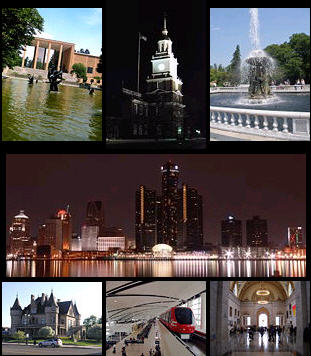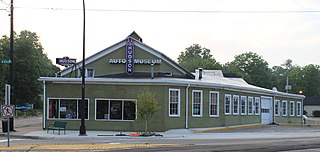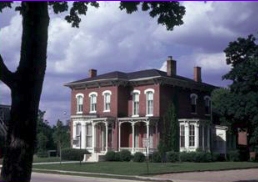
M-1, also known as Woodward Avenue, is a north–south state trunkline highway in the Metro Detroit area of the US state of Michigan. The highway, called "Detroit's Main Street", runs from Detroit north-northwesterly to Pontiac. It is one of the five principal avenues of Detroit, along with Michigan, Grand River, Gratiot, and Jefferson avenues. These streets were platted in 1805 by Judge Augustus B. Woodward, namesake to Woodward Avenue. The Federal Highway Administration (FHWA) has listed the highway as the Automotive Heritage Trail, an All-American Road in the National Scenic Byways Program. It has also been designated a Pure Michigan Byway by the Michigan Department of Transportation (MDOT), and was also included in the MotorCities National Heritage Area designated by the US Congress in 1998.

Metro Detroit is a major metropolitan area in the U.S. state of Michigan, consisting of the city of Detroit and over 200 municipalities in the surrounding area with its largest employer being Oakland County. There are varied definitions of the area, including the official statistical areas designated by the Office of Management and Budget, a federal agency of the United States.

The Woodward Dream Cruise is an annual automotive enthusiast event held in the northern suburbs of Detroit. Held each year on the third Saturday in August, the Cruise runs along Woodward Avenue, a major thoroughfare in the region, from Ferndale to Pontiac.

Hash Bash is an annual event held in Ann Arbor, Michigan, originally held every April 1, but now on the first Saturday of April at noon on the University of Michigan Diag. A collection of speeches, live music, and occasional civil disobedience are centered on the goal of reforming federal, state, and local marijuana laws. The first Hash Bash was held on Saturday, April 1, 1972, in response to the March 9th 1972 decision by Michigan Supreme Court declaring unconstitutional the law used to convict cultural activist John Sinclair for possession of two marijuana joints. This action left the State of Michigan without a law prohibiting the use of marijuana until after the weekend of April 1, 1972. Chef Ra was a fixture of the Hash Bash for 19 consecutive years before his death in late 2006.

Cleary University is a private university focused on business education with its main campus in Livingston County, Michigan. It also has an education center located in Detroit. Cleary University offers certificate, ABA, BBA, MS, and MBA programs.

Ypsilanti High School (YHS) was a public school located in Ypsilanti Township, Michigan. Ypsilanti High School, was a comprehensive high school serving 9–12th grades, located on the western edge of the Ypsilanti Public School District at the corner of Packard and Hewitt Roads.

The Ypsilanti Water Tower is a historic water tower in Ypsilanti, Michigan, United States.

Tourism in metropolitan Detroit, Michigan is a significant factor for the region's culture and for its economy, comprising nine percent of the area's two million jobs. About 19 million people visit Metro Detroit spending an estimated 6 billion in 2019. In 2009, this number was about 15.9 million people, spending an estimated $4.8 billion. Detroit is one of the largest American cities and metropolitan regions to offer casino resort hotels. Leading multi-day events throughout Metro Detroit draw crowds of hundreds of thousands to over three million people. More than fifteen million people cross the highly traveled nexus of the Ambassador Bridge and the Detroit-Windsor Tunnel annually. Detroit is at the center of an emerging Great Lakes Megalopolis. An estimated 46 million people live within a 300-mile (480 km) radius of Metro Detroit.

Depot Town is a commercial area, with some residences above storefronts, in Ypsilanti, Michigan's historic district. Depot Town proper consists of East Cross Street from the Huron River to North River Street, and a small area on the 300-block of North River Street. However, several blocks in the surrounding area are also commonly referred to as part of Depot Town. These areas include Riverside Park, Frog Island Park, and River Street extending north and south for several blocks. First established in the late 1830s, most of the buildings standing today were constructed between 1850 and 1880. Over the years, Depot Town has included hotels, an Underground Railroad station, an American Civil War barracks, and a building that has housed a bar and restaurant continuously for more than 150 years, switching to soft drinks during Prohibition. Today the area is dominated by restaurants and stores. Depot Town also hosts several large summer festivals each year, as well as weekly bike nights and cruise nights.

The Ann Arbor and Ypsilanti Street Railway, known informally as the Ypsi-Ann, was an interurban railroad operating in southeastern Michigan; it was the first such operation in the state.

The Ypsilanti Automotive Heritage Museum in Ypsilanti, Michigan is an automotive museum that features cars assembled at the nearby Willow Run Plant and vehicles made by Hudson Motors. The museum is an official site of the MotorCities National Heritage Area, which is "dedicated to preserving, interpreting and promoting the automotive and labor heritage of the State of Michigan."
The Michigan ElvisFest is an annual two-day festival occurring each July in Riverside Park and Depot Town in Ypsilanti, Michigan, devoted to celebrating singer and actor Elvis Presley.

The Ypsilanti Historical Society, founded in 1961, operates the Ypsilanti Historical Museum and Rudisill-Fletcher-White Archives in Ypsilanti, Michigan, United States. The YHS Museum & Archives are located at 220 North Huron Street in the Historic 1860 Dow House, a Victorian Italianate mansion built in 1860 for Asa and Minerva Dow. Asa Dow moved to Ypsilanti to become the first president of the Ypsilanti Savings Bank. In 1864 Minerva died under unknown circumstances, and Asa sold the home and moved back to Chicago. Minerva Dow was the second person interred at Ypsilanti's newly constructed Highland Cemetery. The house came into possession of the Ypsilanti Historical Society in 1970 after previously being owned by the City of Ypsilanti since 1966. The City purchased the property and other stately homes on the east side of North Huron Street with the design to turn the location into a Ypsilanti version of neighboring Ann Arbor's successful Arborland. Local community members boycotted the effort and the event served as the impetus for the creation of the Ypsilanti Historic District. Prior to 1966 the house was in disrepair, as the home had been turned into at least six apartments since 1922. In 2007 the Fletcher-White Archives moved from the property's two story carriage house into the newly renovated basement of the main house. The Rudisill-Fletcher-White Archives contains a meeting space, a reading room, filing cabinets for document and photograph storage, and a temperature and humidity-controlled storage room. Much of the collections of the YHS Archives are the work product of former Ypsilanti City Historians Louis S. White and Foster Fletcher. The position of Ypsilanti City Historian was discontinued with the retirement of Foster Fletcher and the City of Ypsilanti Archives were transferred from their location at the Downtown Ypsilanti Public Library on Michigan Avenue to the Ypsilanti Historical Society, which has continually grown the collection since.
Back to the Bricks is a car show held annually in Genesee County, Michigan.

Ypsilanti, commonly shortened to Ypsi, is a college town and city located on the Huron River in Washtenaw County in the U.S. state of Michigan. As of the 2020 census, the city's population was 20,648. The city is bounded to the north by Superior Township and on the west, south, and east by Ypsilanti Township. Ypsilanti is a part of the Ann Arbor metropolitan area, the Detroit-Warren-Ann Arbor combined statistical area and the Great Lakes megalopolis. The city is also the home of Eastern Michigan University (EMU).
The Ypsilanti Food Co-op is a food cooperative located in Ypsilanti, Michigan. Located in historic Depot Town, it is Michigan's only solar-powered grocery store. Also owned by the co-op is the River Street Bakery, which features the only wood-fired brick oven in commercial use in Washtenaw County. The Ypsilanti Food Co-op, in turn, is owned by its membership and governed by its board of directors. The shared building also is home to two beehives that are part of the Local Honey Project, managed by members, and they live in the adjacent called "Honeybee Alley".

Prospect Park is a 9.5 acre park in the northeast corner of Ypsilanti, Michigan, and is the oldest park in Ypsilanti. This park, which was originally a cemetery, is the home of a retired coastal defense cannon from Maine, and is currently the home of the restored Luna Lake. The park is one block from Ypsilanti's historic Depot Town, where the YpsiFest and many car shows are hosted in the summer.

Kerrytown is part of the Old Fourth Ward historic district in Ann Arbor, Michigan, USA. It is approximately bound by Main Street to the west, Depot Street to the north, Division Street to the east, and Huron Street to the south. It is known for its brick streets and sidewalks, diverse array of shops and vibrant culture. It includes several iconic establishments, including the Ann Arbor Farmers Market, the Kerrytown Concert House, Zingerman's Deli, the Ann Arbor Hands-On Museum, and Community High School. Kerrytown is also known for its LGBT population and progressive politics.

The Michigan Firehouse Museum and Education Center is a fire museum dedicated to the history of firefighting in the U.S. state of Michigan. It is located at 110 West Cross Street in Ypsilanti, Michigan.
Transportation in Ann Arbor, Michigan is served by several highways, Amtrak and intercity bus lines, and the Ann Arbor Municipal Airport. Local public transportation is provided by Ann Arbor Area Transportation Authority (AAATA).

















